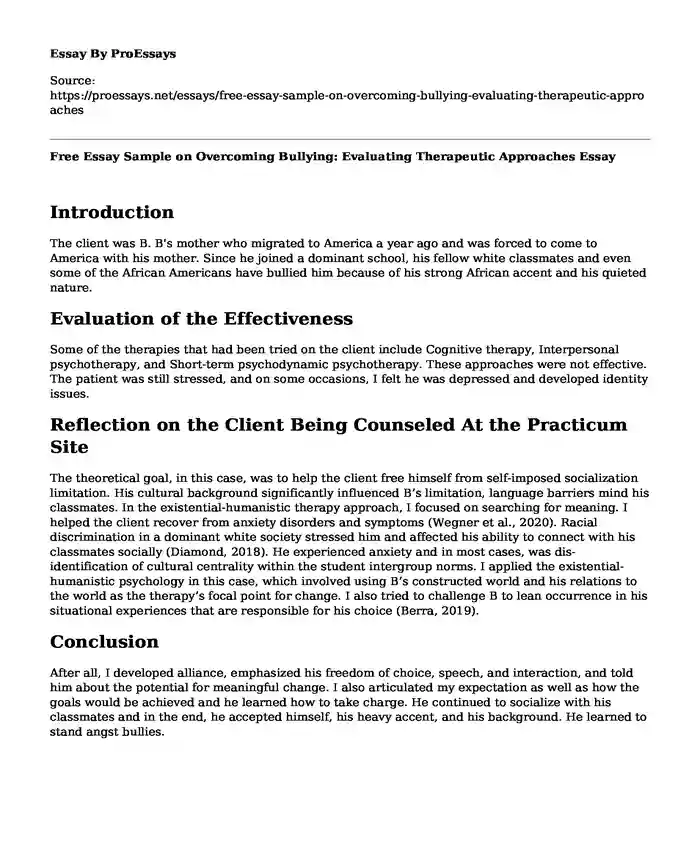Introduction
The client was B. B's mother who migrated to America a year ago and was forced to come to America with his mother. Since he joined a dominant school, his fellow white classmates and even some of the African Americans have bullied him because of his strong African accent and his quieted nature.
Evaluation of the Effectiveness
Some of the therapies that had been tried on the client include Cognitive therapy, Interpersonal psychotherapy, and Short-term psychodynamic psychotherapy. These approaches were not effective. The patient was still stressed, and on some occasions, I felt he was depressed and developed identity issues.
Reflection on the Client Being Counseled At the Practicum Site
The theoretical goal, in this case, was to help the client free himself from self-imposed socialization limitation. His cultural background significantly influenced B’s limitation, language barriers mind his classmates. In the existential-humanistic therapy approach, I focused on searching for meaning. I helped the client recover from anxiety disorders and symptoms (Wegner et al., 2020). Racial discrimination in a dominant white society stressed him and affected his ability to connect with his classmates socially (Diamond, 2018). He experienced anxiety and in most cases, was dis-identification of cultural centrality within the student intergroup norms. I applied the existential-humanistic psychology in this case, which involved using B’s constructed world and his relations to the world as the therapy’s focal point for change. I also tried to challenge B to lean occurrence in his situational experiences that are responsible for his choice (Berra, 2019).
Conclusion
After all, I developed alliance, emphasized his freedom of choice, speech, and interaction, and told him about the potential for meaningful change. I also articulated my expectation as well as how the goals would be achieved and he learned how to take charge. He continued to socialize with his classmates and in the end, he accepted himself, his heavy accent, and his background. He learned to stand angst bullies.
References
Berra, L. (2019). Existential Depression: A Nonpathological and Philosophical-Existential Approach. Journal of Humanistic Psychology, 11(12), 002216781983474.
https://doi.org/10.1177/0022167819834747
Diamond, S. (2018). Existential Therapy and Jungian Analysis: Toward an Existential Depth Psychology. Journal of Humanistic Psychology, 11(11), 002216781880991.
https://doi.org/10.1177/0022167818809915
Hoffman, L. (2020). Existential-Humanistic Therapy and Disaster Response: Lessons From the COVID-19 Pandemic. Journal of Humanistic Psychology, 13(11), 002216782093198.
https://doi.org/10.1177/0022167820931987
Wegner, M., Amatriain-Fernández, S., Kaulitzky, A., Murillo-Rodriguez, E., Machado, S., & Budde, H. (2020). Systematic Review of Meta-Analyses: Exercise Effects on Depression in Children and Adolescents. Frontiers in Psychiatry, 11. https://doi.org/10.3389/fpsyt.2020.00081
Cite this page
Free Essay Sample on Overcoming Bullying: Evaluating Therapeutic Approaches. (2023, Oct 15). Retrieved from https://proessays.net/essays/free-essay-sample-on-overcoming-bullying-evaluating-therapeutic-approaches
If you are the original author of this essay and no longer wish to have it published on the ProEssays website, please click below to request its removal:
- Essay on the Impact of Violent Games on the Aggressiveness of Children and Adolescents
- Essay on Should Children Carry Cell Phones to School?
- Effects of Abuse on Mental Health Essay Example
- Article Analysis Essay on "Accidents on the Road"
- Essay Sample on My Credo for Communication in Interpersonal Conflict
- Essay Sample on Infant Curriculum: Advantages, Features & Benefits
- Cyberbullying Prevention Essay Example







